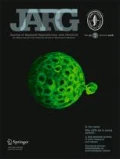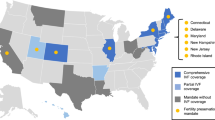Abstract
Purpose
Review of the legal and ethical basis for reproductive endocrinologists to refuse ovulation induction to patients with diminished ovarian reserve.
Methods
The Lexis-Nexis search engine was used to perform a legal review pertaining to refusal of treatment. Ethical opinions of medical organizations were also reviewed.
Results
Federal antidiscrimination laws provide legal recourse for patients with diminished ovarian reserve who are denied ovulation induction. However, the same laws also permit refusal of care when there is bona fide medical justification to decline services. In addition, the codes of ethics for relevant professional organizations support physicians’ decisions to refuse treatment when treatment is futile.
Conclusion
Although it is ethically and legally permissible to deny ovulation induction to patients with diminished ovarian reserve when medically justified, refusal may invite retaliatory litigation. Counseling remains a cornerstone in directing these patients to options with more potential for success, such as donor eggs and adoption.

Similar content being viewed by others
References
Wright VC, Chang J, Jeng G, Chen M, Macaluso M. Assisted reproductive technology surveillance—United States, 2004. MMWR Surveill Summ. 2007;56(6):1–22.
Assisted Reproductive Technology Success rates. National Summary and Fertility Clinic Reports. Atlanta, US Department of Health and Human Services, Centers for Disease Control and Prevention, 2006
Faddy MJ. Follicle dynamics during ovarian ageing. Mol Cell Endocrinol. 2000;163(1–2):43–8.
ASRM: Aging and infertility in women: a committee opinion. Fertil Steril 2002;78(1):215–9
Klipstein S, Regan M, Ryley D, Goldman M, Alper M, Reindollar R. One last chance for pregnancy: a review of 2,705 in vitro fertilization cycles initiated in women age 40 years and above. Fertil Steril. 2005;84:435–45.
Gleicher N, Weghofer A, Barad D. Too old for IVF: are we discriminating against older women? J Assist Reprod Genet. 2007;24(12):639–44. Epub 2007 Dec 4.
Definition of Disability, 42 U.S.C., Sec. 12102(2)(B) (2010). Online
Public Welfare, 45 CFR, Pt. 84 (2001). Online
North Shore. Univ. Hosp. v Rosa, 194 AD2d 727
Elaine W. v Joint Diseases N. Gen. Hosp., 180 AD2d 525
Sumes v. Andres, 938 F. Supp. 9; 1996 U.S. Dist. LEXIS 17346
Bragdon v Abbott, 524 US 624 (1998)
Pacourek v Inland Steel Co, 858 F. Supp. 1393 N.D. Ill. 1994
Americans with Disabilities Act §12182(a) (1990)
Americans with Disabilities Act § 12181(7)(F) (1990)
Ethics Committee of the American Society for Reproductive Medicine. Fertility treatment when the prognosis is very poor or futile. Fertil Steril. 2009;92:1194–7.
Committee on Ethics, American College of Obstetricians and Gynecologists: ACOG Committee Opinion No. 362: Medical Futility. Committee on Ethics, American College of Obstetricians and Gynecologists., Obstet Gynecol 2007;109(3):791–4
Clark CC. In harm’s way: AMA physicians and the duty to treat. J Med Philos. 2005;30(1):65–87.
Author information
Authors and Affiliations
Corresponding author
Additional information
Capsule
Medically justified refusal to provide ovulation induction to patients with diminished ovarian reserve is legally and ethically permissible but requires cautious application.
Rights and permissions
About this article
Cite this article
Karipcin, F.S., Hossain, A. & Phelps, J.Y. A legal-ethical analysis of reproductive endocrinologists’ right to refuse ovulation induction to patients with diminished ovarian reserve. J Assist Reprod Genet 28, 1105–1109 (2011). https://doi.org/10.1007/s10815-011-9636-3
Received:
Accepted:
Published:
Issue Date:
DOI: https://doi.org/10.1007/s10815-011-9636-3




